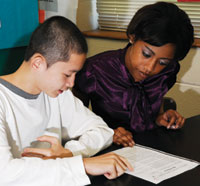CAMPUS
BUZZ
Crash Course
EDUC 2101: Exploring Teaching

Lecture: Tuesdays 12:30-1:20 p.m.
Lab: various times
Instructor: Linda Denson, curriculum
and instruction lecturer
Catalog description: An opportunity to experience a mentorship with public school students while exploring the impact that Gardner’s Multiple Intelligences and personality profiles play in the learning environment. Ten hours of mentorship required. Academic credit awarded. Service learning course.
About the instructor: Denson has been a lecturer in the College of Education since 2001. She was principal at Arlington’s Nichols Junior High from 1989-2001. She received her bachelor’s degree in English from UT Arlington and her master’s in education from the University of North Texas.
Course format: The course meets one hour each week, and students then spend time mentoring youngsters from area schools. The students study about individualized instruction through persona, intelligence and learning style and apply it in their mentoring. They use the Texas Education Agency criteria on learner-centered instruction to create a model of what they think a perfect school would look like.
What the professor says: “The course is intended to do several things. First, it is a pre-service experience for any student who is even slightly considering teaching as a career. This gives the student a chance to try education without the investment of taking college courses and finding out it’s not a good fit. It also teaches students that educating children is the most important vocation in the University. Each functioning adult must support the education of young people. That is the underlying objective of this course, whether you teach or not. You must ensure education of the masses. For the last five years, each student has averaged 20 mentoring hours. This is only a one-hour course, but I am so impressed with their generosity. Many students return the next semester and mentor outside the course. The Arlington Independent School District has used our students as mentors for the AVID (Advancement Via Individual Determination) program in six schools, and now it’s going to be at every school in the district.”
What a student says: “I enjoy working with teenagers. AVID motivates them to explore education and aim not just for graduating from high school but earning a college degree. The program takes students who may not normally choose an honors class, places them in the class and helps them complete the course. It allows them to develop social and problem-solving skills in a classroom setting. The course allows us to be flexible with our schedules and is very beneficial to someone wanting to be a teacher. The interaction with students greatly impacts their decision to teach. I’m a public relations major, so to some it seems awkward for me to be working with children. I believe that to be an effective communicator you should know all different types of audiences. ” – junior Sabrina Zellis, pictured above with Hutcheson Junior High student Tony Ngo
— Jim Patterson
Other Stories
Partners in discovery
Quality Enhancement Plan's pilot projects to launch this fall
Mavericks Personified: Willie Hernandez
Former Movin' Mavs star shoots for success in the wheelchair industry
Learning to serve
Many UT Arlington courses require students to perform community service. For those who enroll, it can be a life-changing experience.
Education, family style
Using their UT Arlington degrees as a foundation, the Ponce siblings fashioned successful careers in law, teaching, computing, engineering and journalism.
Morrow selected to lead women's basketball program
Contact Us
Office of University Publications
502 S. Cooper St.279 Fine Arts Building
Box 19647
Arlington, TX 76019-0647
